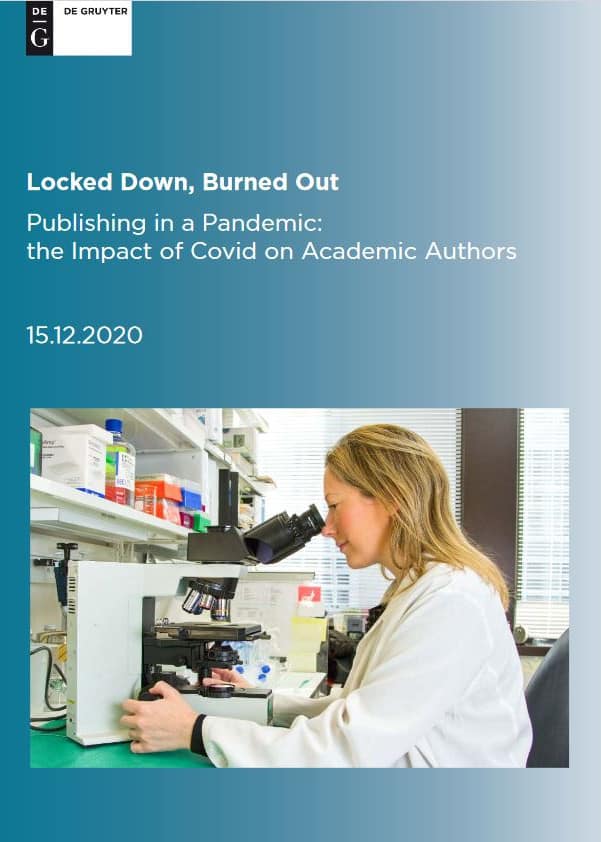Busier than Ever and Burned Out – New Research Reveals the Realities of Publishing in a Pandemic
In the spring, we conducted research which found that the pandemic was making academic authors busier and more stressed out than ever and that gender was an important factor. Six months on, have these pressures changed and if so how?
Learn more about our first author survey in this article: ‘We Asked 3,000+ Academics How They’re Coping with Covid-19: This Is What We found.’
Published today, new De Gruyter research reveals how some academic authors are weathering the Covid storm better than others. The research digs deeper into how gender is having an impact and throws the net wider to examine factors such as life and career stage.
The research report, Locked Down, Burned Out, pulls together the findings of two surveys conducted in May and October 2020 examining the impact of Covid on the work and wellbeing of scholarly authors. In total, the surveys include 4,300 responses from book and journal authors in more than 100 countries.
Conducted as part of De Gruyter’s ongoing commitment to understand and respond to the challenges of its authors, the research reveals why the shift to online teaching and student supervision is proving a disaster for many authors – particularly at mid-career – and worryingly, how overwork and burn out is harming junior scholars.
The research also examines what authors think of new online conference formats and reveals the particular pressures facing humanities scholars.
The research finds:
- 48% of academics who do primary research have produced less than they would do in a typical year.
- 66% of scholars overall now say they can only continue their research with ‘significant limitations.’
- 86% of mid-career authors say that online teaching and student supervision is taking up more time than expected.
- 74% of mid-career scholars say online teaching is the main obstacle limiting their research.
Key report insights include:
- Academics are facing disruptions from three main areas: the demise of collaborative networks, the shift to online teaching from home and the resulting impact of domestic responsibilities and home schooling.
- Mid-career academics who teach are suffering from a ‘double whammy’ of pressures caused by their life stage – they are more likely to have young families and caring duties.
- Mid-career scholars who teach and are women are suffering from a ‘triple whammy’ of challenges because they are also more likely to take on the bulk of domestic duties.
- In many cases, mid-career burn out means that early-career academics are not receiving the support they need from senior peers to climb the career ladder. This impacts on diversity and innovation.
- Late-career researchers remain relatively protected from the worst disruption caused by the pandemic. They are busier but in general are less burdened by many of the challenges that impact junior scholars.
- The pandemic is having a devastating impact on academics’ ability to collaborate, find co-authors and network. Scholars sorely miss face-to-face contact, with mid-career scholars again hit the hardest.
- Online conferences are rated poorly by most academics. Scholars are particularly critical of the ability of online formats to recreate the highly prized social, networking and collaborative aspects of conferencing.
- Humanities scholars are busier and more limited in their work than STM or social science scholars. Many are finding it difficult to continue because access to essential facilities/fieldwork is restricted.
Tom Clark, vice president of global publishing, De Gruyter said:
“Sadly, over the past six months, our research shows that academics have been under more pressure, not less. The challenges they were facing earlier in the year have continued unabated and have, in many cases, intensified. Few challenges have declined. The pandemic is leaving mid-career scholars – and women in particular – feeling burned out and at risk of breaking point. This concerning situation impacts junior researchers, too, as they frequently depend on senior colleagues for career support, guidance and collaboration.
If there’s one thing above all else that this research shows, it’s that academia does not operate outside society – rather, it mirrors it. It should serve as a reminder that when it comes to the pandemic, we are in the same storm but some have better boats than others to weather that storm.”
